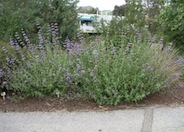
Common name:Matilija Poppy
Botanical name:Romneya coulteri
Crowned by white poppies, this high-impact, spreading gray-green perennial stands statuesque at 5-8" tall. It is best used where its scale and habit will not overpower, and it requires no summer water and thrives on dry alluvial slopes..

Common name:Grevillea
Botanical name:Grevillea 'Canberra'
Bright green, needle-like foliage characterize this evergreen shrub. Its growth is upright and graceful, and branches widely. Its reddish pink flowers are medium to large in size in the spring. Its growth is best with full sun.

Common name:Purple Sage
Botanical name:Salvia leucophylla
The purple sage is an evergreen shrub that grows 2-3' tall by 5-6' wide. It has white tomentose stems and leaves and light purple flowers that bloom between May and June. This shrub tolerates heat and drought. The purple sage is a California native. -Cornflower Farms

Common name:Common Yarrow, Milfoil
Botanical name:Achillea millefolium
Highlighting this perennial are spreading mats of fern-like rosettes, along with deeply divided leaves of a green or grey green color. In this form, the flowers are usually a white tone. Stems can reach 2-3ft above foliage.
The yarrow propagates easily from rooted cuttings or division, which should be performed in the early spring or fall. Following bloom, one should dead head the plant and divide the clumps when it appears crowded.

Common name:Saltillo Evening Primrose
Botanical name:Oenothera stubbei
This ground cover grows quickly to 6" x 4'. The dense mat of dark green foliage provides a nice back drop for the large butter yellow flowers. Blooms appear spring through fall. The flowers have a sweet fragrance and are open from dusk to early morning. Native to northeast Mexico.
An efficient watering system applies the right amount of water to the right parts of the garden at the right time. This conserves water and saves you money.
Click in the green box for more information
Designer:
Photographer: GardenSoft
Physical weed control, including mulching, or hand removal protects the watershed from harmful chemicals.
Mulching and adding compost to soil can minimize evaporation and help soil absorb and store water.
Develop healthy soil for plants that are vigorous and naturally pest-resistant.